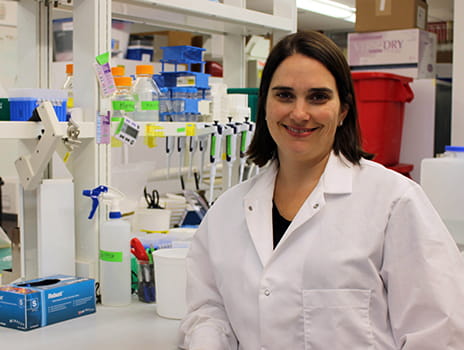August 03, 2020
Seven out of 10 breast cancer cases are hormone-receptor positive, meaning the cancer cells grow in response to estrogen and/or progesterone. The link between these hormones and breast cancer has been known for decades, and scientists continue to explore this relationship to develop better, more effective therapies.
Christy Hagan, PhD, assistant professor, member of the cancer center’s Cancer Biology program, studies progesterone and its relationship to the immune system. Produced primarily in the ovaries following ovulation each month, progesterone plays an important role in a woman’s menstrual cycle and pregnancy.
It’s a common misconception that once a woman reaches menopause, sex hormones like progesterone and estrogen are no longer present in the body. It is true hormone levels decline, but they are still present, and the source of the hormones change. Rather than forming in the ovaries, post-menopause, progesterone originates primarily from fat tissue – like the breasts.
“I am often asked why I study breast cancer and its relationship to hormones, when most people who develop breast cancer are postmenopausal and have low hormone levels,” Dr. Hagan said. “In fact, the large majority of breast cancers in postmenopausal women are powered by hormones.”
Breast cancer can be a slow-developing disease, and a tumor may take years to develop. Dr. Hagan added that cancer may start developing while a woman is transitioning to menopause and producing a mid-range level of hormones.
Estrogen’s role in breast cancer growth is already well-understood, and there are several approved treatments to target the hormone. But that’s just half the story. Estrogen and progesterone work in tandem – the former hormone helps cancerous cells flourish while the latter tricks the immune system. Our ever-watchful immune system flags and constantly removes tiny tumors from our body, often thwarting the development of cancer. This checks and balances function of the immune system is a critical element to our overall health. Progesterone, however, helps the tumor cells go undetected.
“If breast tumor cells circulating in our body are exposed to progesterone, the hormone may conceal the tumor’s danger signals that are normally recognized by the immune system. Our work shows progesterone helps the tumor cells go unnoticed,” Dr. Hagan said. “The question is, can progesterone be blocked?”
Reawakening the immune system
The constant signal of tumor cells can overstimulate our immune system. As a result, the system’s ability to attack tumor cells can become compromised. Immune checkpoint inhibitors are given to patients to reawaken their immune system and effectively fight off the tumor cells. Some types of cancers, like skin cancer and lung cancer, respond more favorably to immune checkpoint inhibitor treatment than others. Others, like breast tumors, are “immune-cold,” meaning they don’t provoke a strong response by the immune system and subsequently don’t respond well to this type of treatment.
“We hypothesize that one reason breast tumors are immune-cold is because progesterone is inhibiting the immune system’s ability to do its job,” Dr. Hagan said. “Incorporating an anti-progesterone may make breast tumors more receptive to immune checkpoint inhibitors.”
Currently, Dr. Hagan and her team are investigating their theory using animal models.
“We are excited about the data we’ve uncovered in our preclinical studies,” Dr. Hagan said. “Lots of studies have centered on estrogen, and scientists have developed highly effective therapies as a result. We believe our work on progesterone holds the same potential.”
